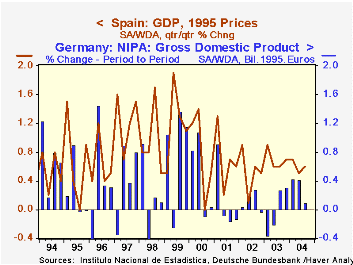 Global| Nov 11 2004
Global| Nov 11 2004German Growth Slows in Q3; Netherlands and Spain See Improvement
Summary
German economic growth slowed in Q3 to almost flat. At 503.15 billion, GDP was up just 0.1% from Q2. Both Q2 and Q1 had 0.4% gains. These stronger periods helped to maintain the year-on-year advance at 1.3%, down just a bit from Q2's [...]

German economic growth slowed in Q3 to almost flat. At €503.15 billion, GDP was up just 0.1% from Q2. Both Q2 and Q1 had 0.4% gains. These stronger periods helped to maintain the year-on-year advance at 1.3%, down just a bit from Q2's 1.4%. The German Federal Statistical Office did not report any detail, but stated in their press release that better domestic demand in Q3 was able to offset a decline in exports to keep growth even slightly positive. Components and other details will be published on November 23.The same combination held in Spain. In what is evidently a new practice, the Spanish National Institute of Statistics ("INE") today published an "anticipated" growth report, citing the total GDP growth for Q3 relative to Q2 and to the year-ago period. A more "dynamic domestic sector" supported growth of 0.6% in the latest quarter, while external demand was more negative than before. The year-on-year pace was 2.6%. The Spanish economy is thus maintaining a robust growth pace compared with other European countries. The details of the Spanish national accounts will be reported on November 24. The new "anticipated" percentage change series have already been added to Haver's Spain database in the national accounts section.The Netherlands, in contrast, experienced weaker domestic demand. Private consumption and private investment both fell in Q3. But stronger exports generated positive GDP growth of 0.2%, a turnaround from the marginal 0.1% decline in Q2. The yearly pace is 1.4%, slightly firmer than in the two prior quarters and the best stretch of growth since early 2001.Yesterday, we described here how the reunified Germany seems to be progressing more slowly than the former Soviet-Bloc nations to its east. It will be some weeks before those countries issue their Q3 GDP data. But today's report for Germany is disappointing after four quarters of fairly good gains and indicates that the country's economy is unable to keep up a steady trend. Stay tuned for more on this story.
| GDP % Changes | 3 Qtr 2004 | 2 Qtr 2004 | 1 Qtr 2004 | Year/ Year | 2003 | 2002 | 2001 |
|---|---|---|---|---|---|---|---|
| Germany | 0.1 | 0.4 | 0.4 | 1.3 | -0.1 | 0.1 | 1.0 |
| Spain | 0.6 | 0.5 | 0.7 | 2.6 | 2.5 | 2.2 | 2.8 |
| Netherlands | 0.2 | -0.1 | 0.8 | 1.4 | -0.9 | 0.6 | -1.4 |
| Domestic Demand | -0.6E | 0.2 | 0.9 | -0.3 | -0.5 | 0.5 | 1.8 |
Carol Stone, CBE
AuthorMore in Author Profile »Carol Stone, CBE came to Haver Analytics in 2003 following more than 35 years as a financial market economist at major Wall Street financial institutions, most especially Merrill Lynch and Nomura Securities. She had broad experience in analysis and forecasting of flow-of-funds accounts, the federal budget and Federal Reserve operations. At Nomura Securities, among other duties, she developed various indicator forecasting tools and edited a daily global publication produced in London and New York for readers in Tokyo. At Haver Analytics, Carol was a member of the Research Department, aiding database managers with research and documentation efforts, as well as posting commentary on select economic reports. In addition, she conducted Ways-of-the-World, a blog on economic issues for an Episcopal-Church-affiliated website, The Geranium Farm. During her career, Carol served as an officer of the Money Marketeers and the Downtown Economists Club. She had a PhD from NYU's Stern School of Business. She lived in Brooklyn, New York, and had a weekend home on Long Island.





